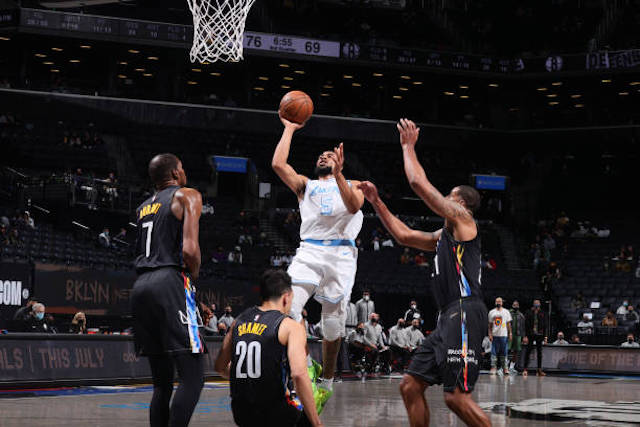Receiving his second start of the season as the Los Angeles Lakers’ injury report continues to swell, Talen Horton-Tucker flaunted his panoply of offensive tricks to help blowout the Brooklyn Nets in their primetime showdown Saturday night.
Horton-Tucker logged 34 minutes in the contest, furnishing 14 points on 4-of-16 shooting (2-of-5 from 3-point range) and a season- and career-high 11 assists to go with three rebounds and three steals.
Shooting concerns aside — 25% on 16 attempts raises your eyebrows for the wrong reason — the 20-year-old guard displayed creativity with the ball not only when he looked to score but when he dished it out to teammates as well. As the box score indicates, along with an assist percentage of 37.9% on the night, there’s plenty to admire about his passing performance, too.
Though much of Horton-Tucker’s ball-handling duties augmented after Dennis Schroder’s ejection during the early minutes of the third quarter, the Lakers utilized him in intriguing ways before that to spread the ball.
Because Schroder is currently the primary initiator for L.A., extracting Horton-Tucker’s talents can be quite laborious because he won’t threaten defenses off the ball. With a fragile 27.4% 3-point clip on the season, it’s why defenders don’t close out hard on his attempts; defenses would rather invest their energy on grabbing the missed shot.
Head coach Frank Vogel is no stranger to adapting and devising new plays to throw off defenses. Instead of granting Horton-Tucker the opportunity to handle the ball, L.A. deploys the combo guard as an off-ball screener to free up the right corner for Markieff Morris.
The initial pick-and-roll between Schroder and Andre Drummond is just a decoy as Morris comes down the baseline while the PnR unfolded. However, both Jeff Green and Kevin Durant are caught in Morris’ revamped and enthralling 3-point shot, which allowed Horton-Tucker to sneakily pop out beyond the arc and hit the jumper.
If he can continue to show progress on his long ball — he’s shooting 50% in April — it’ll only expand the playbook for Vogel and company. Horton-Tucker is devoted to scoring at the rim, but finding situations to involve him in different scenarios forces defenses to think more critically about where the play is going because the tape on THT’s aptness outside of rim scoring is limited.
Here’s a play Horton-Tucker habitually uses to score down low. Drummond arrives to set the high screen to get Horton-Tucker rumbling downhill. But it’s exactly what the Nets expected, evident by LaMarcus Aldridge’s deeper-than-usual drop coverage.
The coverage eliminates Horton-Tucker’s operating room, and after he surveys the area, he decides to launch one from a few feet beyond the arc. Pure swish. If you may recall from earlier, defenders don’t give effort on his attempts — look at Kyrie Irving try to caress THT’s face a few seconds after the release as the remaining four defenders surround the rim for the rebound.
Only 25% of Horton-Tucker’s attempts derive from 3-point range, settling in the eighth percentile, per Cleaning the Glass, a stark difference to 54% of his shots coming at the rim, good for the 100th percentile. Even if the jumper isn’t falling, he must continue to take them — it’s the only way he can improve and deal more damage to the opposition.
Here’s an exquisite manipulation pass from Horton-Tucker to highlight some of his passes after Schroder’s exit.
The Lakers use Montrezl Harrell to switch Blake Griffin onto Horton-Tucker and the much smaller Chris Chiozza on Harrell. Simultaneously, Ben McLemore is swinging up along the wing to receive a pass, drawing Chiozza onto him as an extra defender because McLemore had caught fire in the fourth quarter.
Horton-Tucker looks McLemore’s way but projects it up to Harrell for the slam, puzzling everyone on the court.
This play transpired in garbage time, but it’s the nuance at the end that catches the eye. It’s a high pick-and-roll used to churn momentum for Horton-Tucker’s attack, but instead of putting up a contested shot over the lengthier Alize Johnson, he brings the ball down and delivers a no-look bounce pass to Alfonzo McKinnie situated in the right corner.
The inclination to pass when defenses erase the first option is an area where THT has shown development. Per NBA.com tracking data, Horton-Tucker’s assist to pass percentage of 10% ranks second on the Lakers, trailing only James. It speaks largely to his potential because, among the Lakers who have played at least 20 games this season, Horton-Tucker is second to last in minutes per game.
In regions vital to his expansion as a player, he’s quietly disclosing the talents of a quality player in the making.
Not long ago during the final hours of the trade deadline, Kyle Lowry topped the chart for the next player to don the Purple and Gold. Despite possibly receiving Schroder, Kentavious Caldwell-Pope and a collection of draft picks in return — all of which is debatable if it meets Lowry’s value — the Toronto Raptors held out for Horton-Tucker.
Los Angeles has endured heavy criticism for opting to keep THT, and recent up-and-down performances from the youngster only fueled that narrative further, but the reasoning behind keeping THT is more complex.
The Lakers’ unwillingness to depart with Horton-Tucker didn’t involve the player he currently is — it’s who they hope he can be. This outing is just a glimpse of his dazzling potential.
Have you subscribed to our YouTube channel? It’s the best way to watch player interviews, exclusive coverage from events, participate in live shows, and more!





